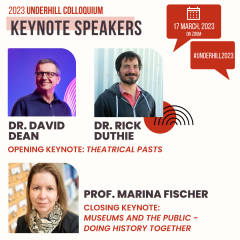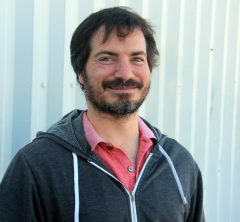Keynote Announcement! We are honoured to welcome these presenters to the 2023 Underhill Colloquium:

Opening Keynote – Theatrical Pasts
How is history represented and re-presented on stage? David Dean, an academic historian who mid-career began to work in theatre, and Rick Duthie, an actor who became an academic historian, chat about their experiences crossing disciplinary boundaries to engage with performing history and history as performance. They will explore four themes: the relationship between the archive and its performance, the tensions between accuracy and authenticity, ways of staging the real, and breaking the fourth wall between actors and audiences
 David Dean is professor of history and co-director Centre for Public History, Carleton University specializing in public history and British history. Recent publications include articles on “Living History” for the Handbook of Digital Public History (2022) and for the Handbook of Reenactment Studies (2021), on “Publics, Public Historians, and Participatory Public History” in Public in Public History (2021), and the co-edited book Migration and Stereotypes in Performance and Culture (2020). Between 2006 and 2012 David worked with the English Theatre Company at the National Art Centre and he is a long-standing activist with the Ottawa-based Workers’ History Museum. A member of the steering committee of the International Federation for Public History, he co-edits its journal International Public History. David is currently writing a book on performing public history for Routledge.
David Dean is professor of history and co-director Centre for Public History, Carleton University specializing in public history and British history. Recent publications include articles on “Living History” for the Handbook of Digital Public History (2022) and for the Handbook of Reenactment Studies (2021), on “Publics, Public Historians, and Participatory Public History” in Public in Public History (2021), and the co-edited book Migration and Stereotypes in Performance and Culture (2020). Between 2006 and 2012 David worked with the English Theatre Company at the National Art Centre and he is a long-standing activist with the Ottawa-based Workers’ History Museum. A member of the steering committee of the International Federation for Public History, he co-edits its journal International Public History. David is currently writing a book on performing public history for Routledge.

Rick Duthie is a performer, playwright and academic who has recently completed his PhD in history at Carleton University with a focus on public history. His research interests include performing public history and oral history, historical representation in theatre, and labour history. He specializes in the use of theatre as a means of engaging with people and their pasts. For his dissertation, he interviewed residents, and then researched, scripted and staged One Day Stronger (2019), a site-specific historical play that focusses on the postwar incidences of strikes in Sudbury, Ontario. Its public presentation and various workshops throughout the creative process, served as a novel instance for collaboration and co-creation between artists, academics, and local community members. Rick hopes that that his work in public history using theatre and oral storytelling will lead to many more exciting projects, and opportunities for further dialogue between artists, audiences, academics, and activists
_________________________________________________
Closing Keynote – Museums and the Public: Doing History Together
A Case Study from the Nickle Galleries at the University of Calgary
What role does a museum play in making history accessible and exciting for wide audiences? How does the work of a museum differ from that of the university? Since public history is more tangible and less abstract than academic history, historians are rediscovering artefacts, and gradually but surely shifting from “an image” to “an object.” The interest in museums is connected to the new way of looking at things, which can be very telling, if their symbolic meaning is properly interpreted and communicated.
The ultimate goal of an exhibition is to move the audiences from existing ideas and preconceptions to a more complex and challenging view of the world. They should go beyond reminiscence or sole commemoration by adding a new perspective, telling history through objects put in context.
This presentation examines museum practices at the Nickle Galleries museum, at the University of Calgary. It discusses what it takes to research, exhibit, educate the public about history, plus the unique potential of a museum to expand the public gaze and make history relevant today.
 Marina Fischer is a Curator of Numismatics at Nickle Galleries, Libraries and Cultural Resources at the University of Calgary. She holds an M.A. in Ancient History with specialization in Art History from the University of Calgary. She oversees the university’s vast money collection of 23,000 objects spanning from the beginning of coinage in the 7th century BCE to the modern era. Marina has curated a number of exhibitions, including The Birth of Portraiture: Alexander the Great and His Successors (2023), Money Zoo: Fantastic Beast in the History of Money (2022), Money and Calgary: The City’s History of Numismatics (2019), Coins of Jesus: Money and Religion in the Ancient World (2017) and is responsible for public engagement and outreach at the museum. She is a recipient of a University of Calgary Teaching Award, and lectures frequently in various departments across campus.
Marina Fischer is a Curator of Numismatics at Nickle Galleries, Libraries and Cultural Resources at the University of Calgary. She holds an M.A. in Ancient History with specialization in Art History from the University of Calgary. She oversees the university’s vast money collection of 23,000 objects spanning from the beginning of coinage in the 7th century BCE to the modern era. Marina has curated a number of exhibitions, including The Birth of Portraiture: Alexander the Great and His Successors (2023), Money Zoo: Fantastic Beast in the History of Money (2022), Money and Calgary: The City’s History of Numismatics (2019), Coins of Jesus: Money and Religion in the Ancient World (2017) and is responsible for public engagement and outreach at the museum. She is a recipient of a University of Calgary Teaching Award, and lectures frequently in various departments across campus.
_________________________________________________
The Underhill Graduate Student Colloquium 2022 is made possible by the generous contribution of the Frank H. Underhill fund.
_________________________________________________
We wish to acknowledge that this Colloquium (and Carleton itself) takes place on the traditional and unceded territory of the Algonquin Anishinaabek/ Omàmiwininiwag. While the conference is virtual, their presence here since time immemorial must be acknowledged.